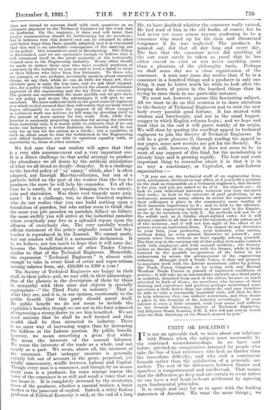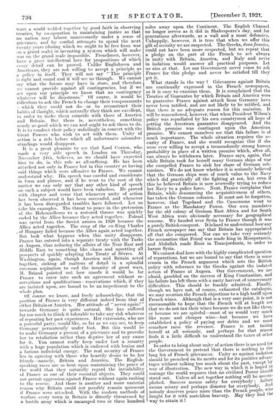UNITY OR ISOLATION ?
IT is not an agreeable task to write about our relations with France when the subject must necessarily be the continued misunderstandings. As wo have said before, patched-up compromises arranged by people who take the line of least resistance, who look no further than the immediate difficulty, and who seek a convenient formula rather than the satisfaction of a principle, are useless. The seat of the differences between France and ourselves is temperamental and intellectual. That means that the differences go deep and are certain to recur unless we can have a real heart-to-heart settlement by agreeing upon fundamental principles. It is simple and easy for us to agree with the leading statesmen of America. We want the same things ; we want a world welded together by good faith in observing treaties, by co-operation in maintaining justice so that no nation may labour unnecessarily under a sense of grievance, and by cordial attempts to spend the next twenty years (during which we ought to be free from war on a grand scale) in inventing a system which will make war on the grand scale impossible. Frenchmen, however, have a great intellectual love for propositions of which every detail can be proved. Unlike Englishmen and Americans, they are not willing to accept a principle as a policy in itself. They will not say " This principle is right and sound and it will see us through. We cannot say what the future may have in store, and therefore we cannot provide against all contingencies, but if we act upon our principle we know that no contingency whatever will be disastrous." Of course, it would be ridiculous to ask the French to change their temperaments —which they could not do—or to reconstruct their habits of thought, which naturally they think are excellent, in order to make them coincide with those of America and Britain. But there is, nevertheless, something nearly as good which we can and ought to ask them to do. It is to conduct their policy unfailingly in concert with the Great Powers who wish to act with them. Unity of action is a rule before which all unfortunate misunder- standings would disappear. It is a great pleasure to see that Lord Curzon, who made a very able speech in London on Thursday, November 24th, believes, as we should have expected him to do, in this rule as all-sufficing. He has been attacked not only in France but in this country as having said things which were offensive to France. We cannot understand why. His speech was careful and considerate in form and phrase, and if he went to the root of the matter we can only say that any other kind of speech on such a subject would have been valueless. He proved with chapter and verse that whenever unity of action has been observed it has been successful, and whenever it has been disregarded troubles have followed. Let us take his examples. The threat to peace in the pretension of the Hohenzollern to a restored throne was quickly ended by the Allies because they acted together. Poland was saved from the Soviet armies in 1920 because the Allies acted together. The coup of the ex-King Charles . of Hungary failed because the Allies again acted together. But look what happens when this unity disappears. France has entered into a separate treaty with the Turks at Angora, thus reducing the affairs of the Near East and Middle East to something like chaos and upsetting all prospects of quickly adapting the Treaty of Sevres. At Washington, again, though America and Britain acted together, sinking all matters of detail in a splendid common aspiration to end the insanity of great wars, M. Briand pointed out how unsafe it would be for France to enter into such an agreement without re- servations and qualifications—reservations which, if they are insisted upon, are bound to be an impediment to the whole plan. Of course we know, and freely acknowledge, that the position of France is very different indeed from that of either Britain or America. Her attitude of " never again!" towards Germany is quite natural. She has suffered far too much to think it tolerable to take any risk whatever of repeating her past experiences. Her extremists, who are a powerful party, would like, so far as we can see, to keep Germany permanently under foot. But this would be to make Germany a present of a grievance and to provoke her to retaliation rather than deprive her of any cause for it. You cannot really keep under foot a country with a huge population which is endowed with brains and a furious industrial energy. The real security of France lies in agreeing with those who heartily desire to be her friends—namely, Britain and America. The English- speaking races arc so bent upon maintaining the peace of the world that they naturally regard the inviolability of France as one of their essential objects. They could not permit aggression against France without again rushing to the rescue. And there is another and more material reason why Britain could not possibly remain quiescent if France were attacked. With the modern methods of warfare every town in Britain is directly threatened by a hostile army which is encamped two or three hundred miles away upon the Continent. The English Channel no longer serves as it did in Shakespeare's day, and for generations afterwards, as a wall and a moat defensive. Unhappily, however, it is true that when we offer this gift of security we are suspected. The Greeks, dons feroues, could not have been more suspected, but we repeat that a pledge on the part of the French to act always in unity with Britain, America, and Italy and never in isolation would answer all practical purposes. Let us aim at that. Let our Government never cease to ask France for this pledge and never be satisfied till they get it.
What stands in the way ? Grievances aaainst Britain are continually expressed in the French newspapers, so it is easy to examine them. It is complained that the Treaties of Guarantee by which Britain and America were to guarantee France against attack from Germany have never been ratified, and are not likely to be ratified, and that there is no adequate reason for this omission. It will he remembered, however, that when President Wilson's policy was repudiated by his own countrymen all hope of getting the American guarantee disappeared. And the British promise was contingent upon the American promise. We cannot ourselves see that this failure is of much importance. The whole situation requires the se- curity of France, and she would recognize this if she were ever willing to accept a tremendously strong human probability in place of a written promise which, after all, can always be withdrawn later. France says, again, that while Britain took for herself many German ships of war she compelled France to sink her share of German sub- marines. We do not know whether it is seriously believed that the German ships were of much value to the Navy which did practically all the fighting at sea, but even if this be believed Britain is now avowedly trying to reduce her Navy to a police force. Next, France complains that Britain, while denouncing the acquisitiveness of others, has taken the German colonies. It must not be forgotten, however, that Togoland and the Cameroons went to France as the Mandatory Power. Our own mandates for the old colony of German East Africa and for South West Africa were obviously necessary for geographical reasons. We handed over Syria to France though it was a purely British conquest. It is hard to understand how any French newspaper can say that Britain has appropriated all that she conquered. Nor can we take very seriously the accusation that Feisul was made king in Mesopotamia, and Abdullah made Emir in Transjordania,, in order to harass Syria. We cannot deal here with the highly complicated question of reparations, but we are bound to say that there is sonic reason in the French argument which sets the British policy with reference to the Greeks against the isolated action of France at Angora. Our Government, we are afraid, gambled on the success of King Constantine, and his failure has left them with a nasty harvest of unnecessary difficulties. This should be frankly admitted. Finally, though we have not, of course, exhausted the catalogue, we may mention the French objections to a high tariff upon French wines. Although that is a very sore point, it is not unreasonable to hope that the French will at length see that we do not tax their wines because we do not like them, or because we are spiteful—most of us would very much like more and cheaper wine—but because we have established a policy of paying our debts and we must somehow raise the revenue. France is not taxing herself at all seriously, and perhaps for that reason finds it a little difficult to understand the taxes of other people. In order to bring about unity of action there is no need for the Government to pretend that there is nothing in the long list of French grievances. Unity as against isolation should be preached on its merits and for its positive advan- tages without talking too much about the past, except by way of illustration. The new way in which it is hoped to manage the world requires that no civilized Power should stand out. Unless all act together nothing will be accom- plished. Success means safety for everybody— failure means misery and perhaps disaster for everybody. And nobody deserves peace more than the French people, who fought for it with matchless bravery. May they find the way to attain it !











































 Previous page
Previous page